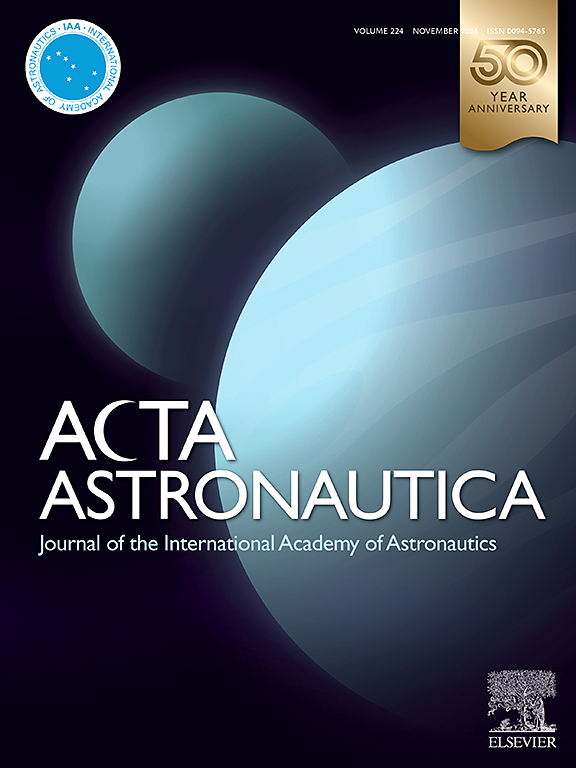Attitude tracking of rigid-liquid-flexible coupling spacecraft by active disturbance rejection control
IF 3.1
2区 物理与天体物理
Q1 ENGINEERING, AEROSPACE
引用次数: 0
Abstract
Considering the complex attitude dynamics of Rigid-Liquid-Flexible Coupling Spacecraft, especially when the large amplitude sloshing of liquid exists in rapid attitude maneuver, the conventional control design method based on the linearized model is not suitable for the significant coupling and strong nonlinearity. By contrast, Active Disturbance Rejection Control is model-independent and easy to design and implement. In this paper, the three main components of Active Disturbance Rejection Control, Tracking Differentiator, Extended State Observer and Nonlinear State Error Feedback are comprehensively applied to the attitude tracking control of Rigid-Liquid-Flexible Coupling Spacecraft. Firstly, two cascaded Tracking Differentiators are used to arrange the transition process of the attitude command, which not only reduces overshoot and oscillation of the tracking process, but also obtains the angular acceleration information of attitude trajectory for feed-forward compensation. Secondly, the total disturbance caused by liquid sloshing and flexible vibration is observed by Extended State Observer and compensated synchronously. Finally, the Nonlinear State Error Feedback is used to further improve the transient behavior and steady-state quality of the control system. The simulation results show that the tracking accuracy of the attitude and angular velocity using the Active Disturbance Rejection Control are about 3–27 times and 6 to 115 times that of the PID control, respectively. The convergence time, overshooting are also significantly less than the PID control.
通过主动干扰抑制控制实现刚液柔耦合航天器的姿态跟踪
考虑到刚性-液体-柔性耦合航天器复杂的姿态动力学特性,尤其是在快速姿态机动中存在大振幅液体荡动的情况下,基于线性化模型的传统控制设计方法并不适用于耦合度大、非线性强的情况。相比之下,主动干扰抑制控制与模型无关,易于设计和实施。本文将主动干扰抑制控制的三个主要组成部分--跟踪微分器、扩展状态观测器和非线性状态误差反馈综合应用于刚液柔耦合航天器的姿态跟踪控制。首先,利用两个级联跟踪微分器来安排姿态指令的过渡过程,不仅减少了跟踪过程的过冲和振荡,还获得了姿态轨迹的角加速度信息,用于前馈补偿。其次,通过扩展状态观测器观测液体滑动和柔性振动引起的总扰动,并进行同步补偿。最后,利用非线性状态误差反馈进一步改善控制系统的瞬态行为和稳态质量。仿真结果表明,采用主动干扰抑制控制的姿态和角速度跟踪精度分别是 PID 控制的 3-27 倍和 6 至 115 倍。收敛时间和过冲也明显小于 PID 控制。
本文章由计算机程序翻译,如有差异,请以英文原文为准。
求助全文
约1分钟内获得全文
求助全文
来源期刊

Acta Astronautica
工程技术-工程:宇航
CiteScore
7.20
自引率
22.90%
发文量
599
审稿时长
53 days
期刊介绍:
Acta Astronautica is sponsored by the International Academy of Astronautics. Content is based on original contributions in all fields of basic, engineering, life and social space sciences and of space technology related to:
The peaceful scientific exploration of space,
Its exploitation for human welfare and progress,
Conception, design, development and operation of space-borne and Earth-based systems,
In addition to regular issues, the journal publishes selected proceedings of the annual International Astronautical Congress (IAC), transactions of the IAA and special issues on topics of current interest, such as microgravity, space station technology, geostationary orbits, and space economics. Other subject areas include satellite technology, space transportation and communications, space energy, power and propulsion, astrodynamics, extraterrestrial intelligence and Earth observations.
 求助内容:
求助内容: 应助结果提醒方式:
应助结果提醒方式:


